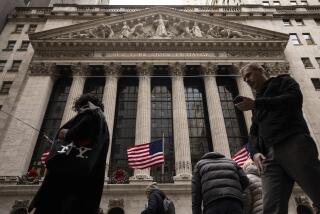Things are looking up -- at the pawn shop
The economy is tanking, banks are scrambling for cover, the Fed is repeatedly cutting interest rates . . . and business is booming at pawn shop Crown City Loan & Jewelry in Old Pasadena.
Standing behind a display case brimming with hocked watches and jewelry, owner Doug Robinson can only smile when asked how things are going.
“Business is very good,” he said. “The loan business is very good.”
These aren’t just any loans, of course. Robinson said the money he hands out -- no questions asked -- in return for people’s collateral typically comes with an annual interest rate of about 60%.
He declined to say how much his loan balance was. But Robinson said it’s risen about 40% in the last year and he expected to do even better this year.
“We’ve been on a continuous uphill run for a number of months,” he said. “I don’t see anything that will stop it.”
For all the reassurance from the Bush administration and Federal Reserve that steps are being taken to keep the U.S. economy from going down the toilet, the harsh reality from the consumer’s perspective is that times are tough and getting tougher.
Last week the Fed cut rates for a sixth time since September and assisted in JPMorgan Chase’s bargain-basement purchase of stricken investment bank Bear Stearns. President Bush tried to put a brave face on an economic outlook that most prognosticators say will be increasingly chilly.
Hi, Mr. Recession!
“I understand there’s short-term difficulty,” Bush said. “But I want people to understand that in the long term we’re going to be just fine.”
I conveyed that sentiment to numerous people in and around Old Pasadena the other day, and none seemed convinced that fineness was just around the corner.
“They say they’re going to turn things around and help people,” said Pasadena resident Darryl Austin, 41, who works as a security guard after serving 12 years in the Marine Corps. “I’m still waiting. I feel like a stepchild in my own country.”
Burbank resident Saul Powell, 45, said that no matter how hard he worked, he was having a hard time keeping his fiscal head above water because of rising gas and food costs.
“Prices just keep going up,” he said. “Why did the government get so aggressive helping Wall Street but isn’t doing anything for Main Street?”
There it is. Many consumers might think that a series of aggressive rate cuts would be helpful for things like mortgages and credit cards. But that’s apparently wishful thinking.
After the latest cut of 0.75 of a percentage point was announced Tuesday, the average for 30-year fixed-rate mortgages fell after weeks of increases, but not as much as might have been expected, considering how much interest rates for 10-year Treasury notes -- a benchmark for mortgages -- have come down.
Analysts say the spread between mortgages and Treasuries is increasing because banks are reluctant to reopen the credit spigot that got them into so much trouble with the sub-prime mortgage mess.
The average rate for a 30-year fixed loan was 5.98% last week, according to a national survey by Bankrate.com. This compares with 6.19% a year ago.
Similarly, credit card rates are budging very little. Six months ago, the average piece of plastic was costing users about 14% in interest for revolving balances. Now it’s about 13%.
Things also aren’t getting any better for people who believe in squirreling away cash for a rainy day. All those rate cuts are taking their toll on savings accounts, money-market accounts and certificates of deposit.
That’s not to say your money is going to disappear, even if your bank goes belly-up. The Federal Deposit Insurance Corp. insures ordinary accounts up to $100,000 and retirement accounts up to $250,000.
On the other hand, six-month CDs and money-market accounts are currently paying an annual rate of less than 3%. The cost of living, by contrast, was up 4% last month from a year earlier.
That doesn’t bode well for savers like 19-year-old Brittany Green, who attends Pasadena City College while also raising an 8-month-old daughter. She told me she had about $1,500 in savings and wasn’t sure what to do with it.
I told her that by slashing interest rates, the government basically wanted her to do one of two things: go out and spend it or invest it in the stock market. Either one would give the economy a little boost.
Green shook her head. “I’m not spending it,” she said. “And I wouldn’t put it in the stock market. That’s like playing the lottery.”
Back at the Crown City pawn shop, Robinson, the owner, said his vantage point on the economy suggests that people need money just to get by, but they’re having a hard time getting it from banks.
“People have used up their available cash and credit,” he said. “We loan to people that the banks do not. If you bring in something worthy of a loan, we’ll make the loan.”
Robinson said about 89% of his loans last year were eventually redeemed by customers, despite the sky-high interest rate. He said he wasn’t so sure about this year. People just might not have the money.
In that case, though, Robinson said, he’d just sell off whatever was left as collateral -- a Rolex watch, say, or a pair of diamond earrings.
The government can be doing more to cushion people from the economic downturn. For one thing, why aren’t lower rates for banks to borrow money being passed down the financial food chain in the form of lower rates for consumers?
Whether that takes a gentle nudge from the Fed or more overt regulatory action, it would help convey that we’re all in this together.
It’d also be nice to see more concrete measures to help people who are either losing their homes or in danger of being turned out on the street. The government did this during the Great Depression and it could certainly provide a helping hand now.
Bush may be right -- things will be fine over the long haul. But for the moment, things seem quite grim.
Down the street from Crown City, I encountered Chad Pratt, a 44-year-old lawyer, who said his business was also thriving, thanks mainly to the desperation of many of his clients.
“There are more evictions, more divorces,” he observed. “People are losing their homes, their jobs. You can feel how scared people are.”
I replied that it was kind of sad that Pratt was doing so well off of other people’s misery. He nodded his agreement.
“I’m a bottom feeder,” he said with a what’re-you-gonna-do shrug. “I’m a predator. This is how it is.”
And no rate cut’s going to change that.
Consumer Confidential runs Wednesdays and Sundays. Send your tips or feedback to david.lazarus@latimes.com.







